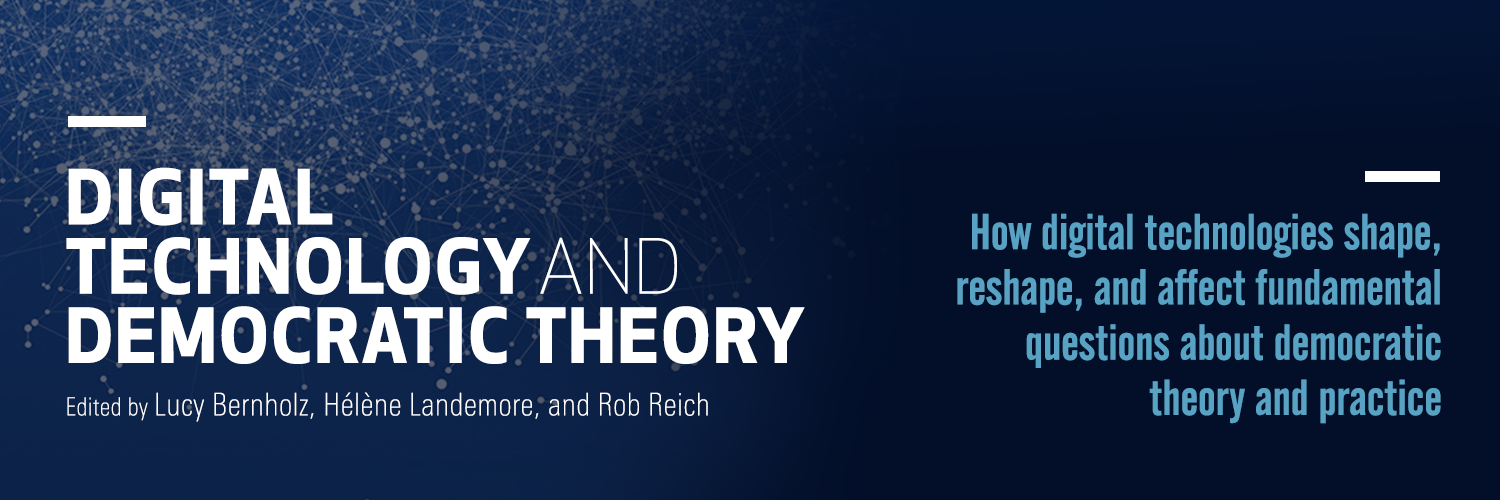BOOK: Digital Technology and Democratic Theory
Edited by Lucy Bernholz, Hélène Landemore and Rob Reich



One of the most far-reaching transformations in our era is the wave of digital technologies rolling over—and upending—nearly every aspect of life. Work and leisure, family and friendship, community and citizenship have all been modified by now-ubiquitous digital tools and platforms. Digital Technology and Democratic Theory looks closely at one significant facet of our rapidly evolving digital lives: how technology is radically changing our lives as citizens and participants in democratic governments.
To understand these transformations, this book brings together contributions by scholars from multiple disciplines to wrestle with the question of how digital technologies shape, reshape, and affect fundamental questions about democracy and democratic theory. As expectations have whiplashed—from Twitter optimism in the wake of the Arab Spring to Facebook pessimism in the wake of the 2016 US election—the time is ripe for a more sober and long-term assessment. How should we take stock of digital technologies and their promise and peril for reshaping democratic societies and institutions? To answer, this volume broaches the most pressing technological changes and issues facing democracy as a philosophy and an institution.

EXCERPT:
“Open Democracy and Digital Technologies,” by Hélène Landemore
Meet Angeliki Papadopoulos. She is a twenty-eight-year-old woman who lives on the outskirts of Athens in the year 2036. It’s almost 8:30 on a beautiful April Sunday morning, and she is just about to pour herself a cup of coffee before reading the news on her laptop. Angeliki logs into her Citizenbook account, a platform initially called Facebook, which was renamed by the public in the year 2025, when its founder, Mark Zuckerberg, decided to withdraw from the company and donate all his shares to a nonprofit foundation run along democratic lines. The company was then repurposed as a deliberative platform for democracy. As Angeliki opens the news tab, her attention is drawn to a flashing sign alerting her that she is overdue for two votes, one on a somewhat complicated issue of environmental law and the other on the choice of a delegate to represent Europe at the next international trade summit in Rio de Janeiro. She decides to ignore the flashing sign and contemplates instead whether she shouldn’t delegate the first vote to her uncle, who is a marine biologist and would know better, and just abstain on the second vote. She just does not have time this weekend to read up on the relevant literature…Read more here.
“We must consider whether and how our networks of digital communications accommodate and protect individual rights to expression and association in ways that also protect privacy and resist corporate or state surveillance.”
Lucy Bernholz
Use the promo code DTANDDT to receive a 30% discount when ordering directly from the University of Chicago Press.
You may also order from Bookshop, IndieBound, and Amazon.

READ THE REVIEWS
“This book serves the much-needed purpose of advancing the conversation about the impact of technology on democratic theory and the role of democratic theory in helping us to understand the relationship between technology and power. This diverse collection of essays addresses how to reimagine the informational diet of democracy, free speech and association, the boundaries of the demos and political exclusion. An important and engaging read!”—Beth Simone Noveck, Director, The Governance Lab
“At a moment when democracy around the world is being weakened, challenged, and attacked, this volume is a timely and essential addition that will help its audience understand the affordances—but also the very real detrimental effects—of social media in society on our governing principles and institutions. We urgently need this expert realist approach and global perspective if we are to have any chance of effectively engaging with these tech firms and their technologies and any hope of guarding democracy against the outsize impact of both.”—Sarah T. Roberts, University of California, Los Angeles
“Bernholz, Landemore and Reich do a masterful job of placing technological change within democratic theory. At a time when technologists and policy advocates have outsized influence in our discussions of our digital lives, this volume forces us to situate contemporary controversies within long traditions of philosophical debate.” —Nate Persily, Stanford University

